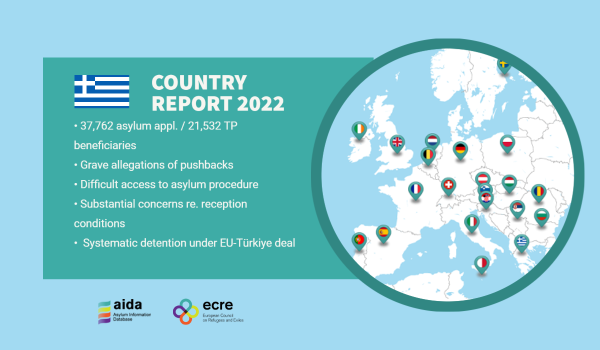The updated AIDA Country Report on Greece provides a detailed overview on legislative and practice-related developments in asylum procedures, reception conditions, detention of asylum seekers, content of international protection, as well as procedure for and content of temporary protection in 2022.
In 2022, the Greek Asylum Service received a total of 37,762 asylum applications, mainly from applicants from Afghanistan, Syria, Pakistan, Palestine and Iraq. The recognition rate for cases examined on the merits at first instance stood at 57.4%. However, in 3,601 first instance cases applicants were not provided with access to an in merits examination: their applications were examined under the safe third country concept with Türkiye designated as a safe third country for certain applicants, despite the fact that that there have been no readmissions since March 2020. In February 2023, the Council of State referred a question to the CJEU on this matter.
The overturn rate upon appeal continued to be very low at 11.74%, although up from 4% in 2021. However, 1,790 appeals were rejected as “manifestly unfounded” without an in-merit examination, due to the fact that the appellants did not comply with disproportionate administrative burdens, and 2,696 appeals received inadmissibility decisions based on Türkiye as a safe third country.
Concurrently, 21,532 persons were granted temporary protection in Greece in 2022. The temporal scope of protection was broader than that of the EU decision as persons who had arrived in Greece from 26 November 2021 onwards were eligible for temporary protection if they had been unable to return due to the war.
At least 18,780 refugees and migrants arrived in Greece in 2022, a 105% increase compared to 2021. However, this may be an underrepresentation given the number of alleged pushbacks that continued to be systematically reported in 2022. These have been criticised at large including by UN, Council of Europe and EU bodies. In July 2022, the ECtHR found violations of articles 2 and 3 ECHR by the Greek government in the case of a shipwreck which occurred during an alleged pushback, resulting in the death of 11 people. The newly established mechanism for compliance with fundamental rights has been widely criticised with regard to independence and effectiveness. Moreover, human rights organisations and lawyers supporting pushback victims face defamation, intimidation and risk of criminalisation.
Access to the procedure also remains highly problematic, due to the dysfunctional online appointment system for registration. In addition, those who present themselves at the registration facilities risk de facto detention for up to 25 days. Access to the procedure for subsequent applications is also hindered by a fee, the principle of which has been contested before the Council of State (the decision is pending). Moreover, despite a slight decrease in pending cases, processing times for applications continue to be extremely long.
As regards reception, those arriving on the islands continue to be subject to a geographical restriction order, applied en masse without prior assessment. In August 2022 the ECtHR granted interim measures in the case of vulnerable applicants in need of emergency medical treatment stuck in Samos despite the fact that they could not receive appropriate medical treatment on the island. Approx. 2/3 accommodated asylum seekers were housed in mainland camps, while 4,371 persons remained in closed centres on the islands. The ESTIA accommodation scheme, which housed 1,843 applicants, was terminated in November 2022. Living conditions in mainland camps were increasingly reported as poor and unsanitary; significant concerns were also reported regarding the new closed control access centres on the islands, including those recently improved such as Samos.
During 2022, applicants for international protection as well as rejected asylum seekers continued to be systematically detained without any proper consideration of the prospect of return to Türkiye, despite returns being suspended since March 2020. Moreover, applicants who have booked a registration appointment through the official platform are in practice arrested and detained in view of removal, despite holding a document proving the appointment. In both scenarios, the illegality of the situation has been pointed out by courts. In many cases, detention conditions fail to meet adequate standards. No free legal aid is provided for a detainee to challenge their detention decision before Courts, contrary to national and EU law.
As regards beneficiaries of international protection, long waiting periods were observed for renewal of residence permits, time during which BIPs cannot effectively access any rights except that they do not risk detention. Moreover, due to inter alia length of procedures and documentation requirements, BIPs continue to be unable to effectively exercise their right to family reunification. Lastly, homelessness and destitution of BIPs continue to be a very prominent issue, prompting Germany and the Netherlands to refrain from returning BIPs to Greece as a matter of policy.
For further information:
- Find comparative information in the Asylum Information Database (AIDA) managed by ECRE.

